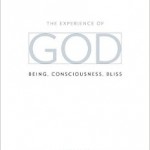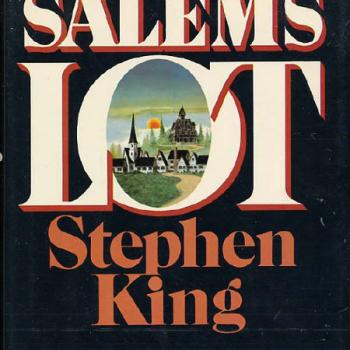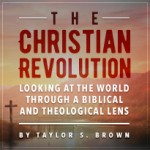The word “evangelical” is one that has increasingly been losing its meaning over the last couple of years, at least in its American context. With the election of Donald Trump last year and the recent election hubbub in Alabama surrounding Roy Moore, evangelicals (white evangelicals anyway) have increasingly been willing to sell their morals and virtues down the river in exchange for political power. One need only look at Franklin Graham’s Twitter account as a prime example of the apple falling far from the evangelistic tree. All of this is sadly reminiscent of Esau throwing away his birthright for a bowl of stew, swindled by his trickster younger brother, Jacob (Gen. 25:29-34).
One is tempted to think that all of this besmirching of American evangelicalism’s history and tradition is a recent innovation. And one would largely be wrong in that hagiographic portrait. While evangelicalism broadly speaking does have a rich and admirable history (I think of my own theological tradition’s beginnings in the revivals led by the Wesley brothers in 18th century England), the American subset of the tradition has long had a problematic and syncretistic relationship with political power.
As a student of Christian history and as someone who grew up as a Southern Baptist in the heart of the Bible Belt, I have long been aware of this dangerous affair between American evangelicals and political power (and again, I must stress that I am speaking specifically of American evangelicalism here, not evangelicalism globally). However, Frances FitzGerald’s recent book, The Evangelicals: The Struggle to Shape America (Simon & Schuster, 2017) has illustrated this phenomenon in a new and much more vibrant way for me.
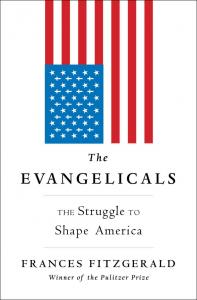
While the book is meant to be a general history of American evangelicalism, FitzGerald’s primary focus is how American evangelicals have, from the very beginning of the movement (and especially since the First Great Awakening), sought to shape American society in a manner they saw fit. This was sometimes good (many Northern evangelicals were ardent abolitionists and proponents of educational reform), and sometimes bad (many Southern evangelicals twisted the Bible to support chattel slavery and squash efforts that sought to reconcile Christian faith and science).
One area in this overall presentation that really stuck out to me as an aspiring scholar and teacher of the Bible was the formulation of the modern version of inerrancy among the hardline, Calvinist thinkers of “Old Princeton” Seminary. Charles Hodge, the famed systematic theologian and principal of the ardent five-point Calvinist faculty at Princeton Seminary in the late nineteenth century, was the first major American thinker to promulgate inerrancy as we know it today. His theological heirs—A. A. Hodge, B. B. Warfield, and J. Gresham Machen—would later harden the doctrine into the verbal plenary model that—combined with a strong biblical literalism—many American evangelicals hold today and that is promoted by such outlets as the Gospel Coalition.
Now before I go further let me make myself clear about my views on the Bible. I wholeheartedly and without reservation affirm that the Bible is inspired by the Holy Spirit, is the primary authority in all things related to salvation and the Christian life (I’m Wesleyan, so prima Scriptura rather than the Lutheran/Reformed sola Scriptura is part of my English Reformation heritage), and is true in its witness to God’s mighty acts in history, culminating in the life, death, and bodily resurrection of Jesus Christ. I simultaneously affirm this doctrine of the truthfulness and inspiration of the Bible with my strong affirmation of the Apostles, Nicene, and Chalcedonian Creeds. In many ways, my own views on the truthfulness, authority, and inspiration of the Bible mirror those of the third chapter of the Vatican II Dogmatic Constitution on Divine Revelation Dei Verbum:
11. Those divinely revealed realities which are contained and presented in Sacred Scripture have been committed to writing under the inspiration of the Holy Spirit. For holy mother Church, relying on the belief of the Apostles (see John 20:31; 2 Tim. 3:16; 2 Peter 1:19-20, 3:15-16), holds that the books of both the Old and New Testaments in their entirety, with all their parts, are sacred and canonical because written under the inspiration of the Holy Spirit, they have God as their author and have been handed on as such to the Church herself.(1) In composing the sacred books, God chose men and while employed by Him (2) they made use of their powers and abilities, so that with Him acting in them and through them, (3) they, as true authors, consigned to writing everything and only those things which He wanted. (4)
Therefore, since everything asserted by the inspired authors or sacred writers must be held to be asserted by the Holy Spirit, it follows that the books of Scripture must be acknowledged as teaching solidly, faithfully and without error that truth which God wanted put into sacred writings (5) for the sake of salvation [author’s note: Notice here that the document affirms inerrancy only in regard to salvation. This is very different from the evangelical inerrancy being critiqued in this post. I wholeheartedly affirm this sort of particularized “soteriological inerrancy” but not the broad-scope inerrancy of much of American evangelicalism]. Therefore “all Scripture is divinely inspired and has its use for teaching the truth and refuting error, for reformation of manners and discipline in right living, so that the man who belongs to God may be efficient and equipped for good work of every kind” (2 Tim. 3:16-17, Greek text).
12. However, since God speaks in Sacred Scripture through men in human fashion, (6) the interpreter of Sacred Scripture, in order to see clearly what God wanted to communicate to us, should carefully investigate what meaning the sacred writers really intended, and what God wanted to manifest by means of their words.
To search out the intention of the sacred writers, attention should be given, among other things, to “literary forms.” For truth is set forth and expressed differently in texts which are variously historical, prophetic, poetic, or of other forms of discourse. The interpreter must investigate what meaning the sacred writer intended to express and actually expressed in particular circumstances by using contemporary literary forms in accordance with the situation of his own time and culture. (7) For the correct understanding of what the sacred author wanted to assert, due attention must be paid to the customary and characteristic styles of feeling, speaking and narrating which prevailed at the time of the sacred writer, and to the patterns men normally employed at that period in their everyday dealings with one another. (8)…
…13. In Sacred Scripture, therefore, while the truth and holiness of God always remains intact, the marvelous “condescension” of eternal wisdom is clearly shown, “that we may learn the gentle kindness of God, which words cannot express, and how far He has gone in adapting His language with thoughtful concern for our weak human nature.” (11) For the words of God, expressed in human language, have been made like human discourse, just as the word of the eternal Father, when He took to Himself the flesh of human weakness, was in every way made like men.
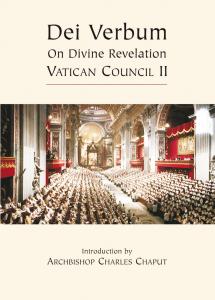
All of that should establish my orthodox bona fides and my high regard for the inspiration and authority of the Bible.
And yet, despite all of these affirmations, I do not accept the modern conception of the inerrancy of Scripture. While a detailed analysis of this position would take a small book to explain, suffice it to say that I believe that the doctrine of inerrancy is premised on a faulty conception of how all information is supposed to be communicated. Specifically, it is premised on the post-Enlightenment notion that the only valid way to communicate truthful data is in the form of discrete, propositional statements or counter-statements. Think of a modern textbook as an example of this. It simply presents its data in the form of a propositional statement (“Water is a chemically composed of two hydrogen molecules and one oxygen molecule”) and leaves it at that.
No nuance. No artistry. Just cold hard data. And that works for science textbooks; just not for much else.
Needless to say, only a very small subset of information is actually communicated in this way, and it is a false presupposition to say that all information (including divine information) should be communicated as such. Some of the most profound truths about the world and ourselves are communicated, not through propositional truth-statements, but through poetry, parables, and historical narrative, the very genres that the Bible is composed of. To quote Dei Verbum again:
For truth is set forth and expressed differently in texts which are variously historical, prophetic, poetic, or of other forms of discourse. The interpreter must investigate what meaning the sacred writer intended to express and actually expressed in particular circumstances by using contemporary literary forms in accordance with the situation of his own time and culture.
“For truth is set forth and expressed differently in texts which are variously historical, prophetic, poetic, or of other forms of discourse.” This is a key tenet of all good biblical interpretation and it is obscured by the modernist and literalist view of inerrancy that—whether many of its exponents realize it or not; though some thankfully do—is built upon the presupposition that all valid truth content should be dispensed in the form of propositional statements, and, if it isn’t in such a form, it should be turned into such (more on this below).
At this point many of you are probably asking, “But all of this is the realm of biblical studies and interpretation. What does this have to do with American evangelicals and their idolatrous quest for power?” Well, a selection from FitzGerald’s book will set the stage for this. Here, FitzGerald gives a summary of the Old Princeton formulation of inerrancy:
American Protestants [in the 19th and early 20th centuries] had great reverence for the Bible and most would have said it was true, but in declaring the Scriptures “free from all error” [Charles] Hodge was taking a theologically eccentric stance. For all his claim of fidelity to the Reformation, his position was not that of Luther or Calvin. Luther had freely acknowledged that the Bible contained various contradictions and errors of historical fact. He judged that the prophets had often erred in their predictions, and he taught that the Gospel message, which was oral in character, should not be equated with the scriptural text. Calvin, though more cautious, had judged that the biblical writers were not overly concerned with factual accuracy, and that some of their ideas about natural phenomena—that the moon was larger than Saturn—came from the worldview of the ancients. For both, the truth of the Bible lay not in such details, but in the deeper wisdom and its capacity to bring faithful readers to the saving knowledge of Christ through the illumination provided to them by the Holy Spirit. True, many post-Reformation dogmatists had, in an effort to shore up Protestant truth claims, contended that the Bible was verbally-inspired and error free. [Francis] Turretin had been adamant on the subject. “The prophets did not make mistakes in even the smallest particulars,” he wrote. “To say that they did would render doubtful the whole of Scripture.” But this position did not become canonical. For one thing it was well known that the successive transcriptions and translations of the Bible did not perfectly accord with each other. For another, Turretin had explained that the Bible was errorless because God dictated the words to the biblical authors and the idea that the apostles were nothing more than scribes was unacceptable to many theologians. The 17th century Westminster Confession made no mention of inerrancy, but simply stated that the Scriptures were, “given by the inspiration of God to be the rule of faith and life.” Two centuries later, Turretin’s position was the creed for the Old School Presbyterians.
Pressed to explain how biblical authors got every word right, Hodge and successors said they didn’t believe in mechanical dictation and, though they had certainly read Turretin thoroughly, they claimed no one had ever believed in such a thing. “The Church has never held what has been stigmatized as the mechanical theory of inspiration,” Hodge wrote. “The sacred writers were not machines.” What then was the explanation? Their answer was that the method by which the Holy Spirit had inspired the writers to select the right words was inscrutable.
Hodge, for his part, acknowledged that some small errors might have crept into the Bible as flecks of dust into the marble of the Parthenon, but in the 1880s, when German biblical scholarship was taking hold in most seminaries, his successors, A. A. Hodge and B. B. Warfield, took a firmer stand. In a jointly written article in the Presbyterian Review of 1881, Hodge declared that “all the affirmations of the Scripture of all kinds…are without any error,” and Warfield went so far as to say, “A proved error in Scripture contradicts not only our doctrine, but the Scripture claims and, therefore, its inspiration in making those claims.” In other words, if even the tiniest error were found in the Bible, all truth claims for the Christian faith would collapse.
Wagering all of Christianity on the accuracy of every single “and” or “but” in the Scriptures would seem a foolhardy thing to. However, the Princeton scholars had a few years earlier added a qualification; the doctrine of inerrancy applied only to the “original autographs” of the Bible. The surviving copies of the Scriptures, they conceded, had been corrupted by scribal errors; it was the manuscripts that came from the hands of the prophets that were infallible. The qualification was a retreat, but a strategic one. The “original autographs” did not, of course, exist, so no “proved error” could be found in them, and the Princeton doctrine was safe from biblical scholarship. Yet the fact that Hodge and Warfield were positing an imaginary Bible was a subtlety lost on most nonscholars. For many Presbyterians, the Bible they held in their hands was on the authority of Princeton inerrant, and every sentence was to be taken for fact.
– Frances Fitzgerald, The Evangelicals: The Struggle to Shape America, pp. 77-79
Again, we can see here how, for figures like the Hodges and Warfield, the emphasis on truth has shifted. It has moved from the Truth which the inspired yet-still-human writers of the Bible were witnessing to (the acts of God in history culminating in the Christ event), to the text of the Bible itself. The Bible was shifted from being the primary, recorded witness to the Logos, to the Logos itself. Within this framework the words of the Bible are no longer the historically and contextually-situated linguistic signs which point us to the risen Christ. Rather, they become containers of semantic propositional statements that inerrantist expositors wield in the battle for truth. And since the locus of truth is no longer on God, but on the words of Scripture themselves, every single affirmation in the Bible must be taken as literally true.
This is not the historical position that the Bible is without error only in regards to everything related to salvation and the Christian life (the position of Luther, Calvin, and most recently laid out in Dei Verbum). This is the position that turns the Bible into a modern catch-all book. It must be true in regards to everything: science, government, economics, geo-politics, and, most absurdly, diet plans based on the book of Daniel.
This is what happened in the Fundamentalist-Modernist controversy of the 1920s. And it is sadly what is happening now within American evangelicalism. When Roy Moore can rally supporters by quoting the Psalm 40, while simultaneously ignoring both the the larger historical context of the text and the ethical imperatives of the Christian faith, the Bible is no longer being used as the witness to the Truth of God’s rescue of the world in Christ. Instead it has become a kind of propositional bludgeon; a way to use “truth” to elevate oneself as truly pious and righteous, over and against those who “don’t really believe the Bible,” and thus are not in God’s good graces.
My problem with the modern, evangelical view of biblical inerrancy is not simply academic. It is not simply that I find it to be built upon problematic epistemological premises. It is that when you shift the emphasis of Scripture away from the One to Whom it testifies, and to the words of the Bible itself, you actually begin to turn the Bible from one of God’s primary means of grace for His people into an idolatrous weapon in the quest for power.
You use it to dominate those who you deem as impious or incorrect.
You sacrifice your Christian imperative to witness to Christ by means of biblical testimony upon the altar of subjugating power.
It is truth without love, which is actually not truth at all.
I no longer identify as an evangelical in my American context (were I somewhere else, like England for instance, I would likely still use the label) nor do I subscribe to biblical inerrancy. Instead I identify as a “creedal Christian” and subscribe to the truthfulness, authority, and inspiration of Scripture. But this is not because my Christian faith nor my love for the Bible has weakened. On the contrary, I find the Christian view of reality more and more compelling in these trying times. I find that the Bible offers more and more profound truths about God, humanity, the world, and the rescue of creation from the grips of sin and death.
No, I reject the label “evangelical” and the modern doctrine of inerrancy because I find them to be sub-Christian. A Christian is someone whose life should be a continual witness to the reality of the resurrected Jesus and the Bible is the chief means of grace provided by God to witness to that glorious reality. When the Bible becomes nothing more than an inerrant, ideological bludgeon though, it ceases to be the means of grace God has provided for his people. Instead it has been twisted into an idol by those who seek power above all else; the power of politics, the power of false piety, and the twisted marriage of the two. That is not the faith I profess, nor the Bible I study, nor the God I worship.

